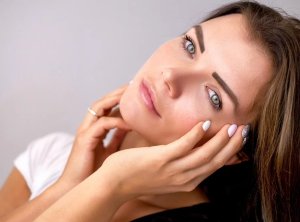 Vitamins are widely used as cosmetic ingredients due to their impressive skin and hair benefits. For instance, retinol (vitamin A) is one of the most used anti-ageing and anti-acne ingredients. Let’s take a closer look at the numerous cosmetic benefits of vitamin A and its use in skin and hair care products.
Vitamins are widely used as cosmetic ingredients due to their impressive skin and hair benefits. For instance, retinol (vitamin A) is one of the most used anti-ageing and anti-acne ingredients. Let’s take a closer look at the numerous cosmetic benefits of vitamin A and its use in skin and hair care products.
Strictly speaking, vitamin A is not a single compound, but rather a group of organic compounds that includes retinol, retinal, retinoic acid, and carotenoids (provitamin A). However, retinol is the primary naturally occurring form of vitamin A, and for most people, these two terms are synonymous.
Pure retinol is extremely sensitive to oxidization, so it cannot be used as a cosmetic ingredient. Cosmetic products are usually formulated with retinol esters, such as retinyl acetate and retinyl palmitate, which serve as a much more stable source of vitamin A. Some skincare products contain retinaldehyde (retinal) or retinoic acid instead; however, in certain countries products with high concentrations of retinoic acid are prescription only.
Each of the forms of vitamin A has its pros and cons when it comes to cosmetic applications, and their concentration in cosmetic formulations plays a big role, too. For example, the concentration of retinyl palmitate should be considerably higher than the concentration of pure retinol in order to provide a tangible effect. On the other hand, retinyl palmitate is more gentle and therefore more suitable for sensitive skin.
This being said, all forms of vitamin A have similar skin benefits. Here’s just a brief list that covers the most important benefits of vitamin A:
- It has an antioxidant effect and anti-ageing properties.
- It reduces skin pigmentation and evens out skin tone.
- It stimulates the production of collagen and elastin in the skin.
- It activates skin cell regeneration and renewal.
- It makes the skin smoother.
- It boosts the skin’s elasticity and firmness.
- It helps to eliminate acne and prevent acne scars.
- It hydrates the skin and helps it to retain moisture.
The anti-age properties of vitamin A are the main reason it is so widely used in cosmetic formulations. A good part, if not the majority, of popular anti-age products contain some form of vitamin A. The thing is, vitamin A has the ability to stimulate collagen synthesis, as well as neutralises the harmful effects of free radicals that are responsible for premature skin ageing. As a result, this ingredient smooths out fine lines and reduces other signs of ageing.
Retinoids are also valued for their anti-acne properties. Retinol and its derivatives can often be found in various products for oily, combination or problem skin, as well as in anti-acne treatments. In this case, vitamin A stimulates skin cell metabolism, normalises sebum secretion in the epidermis and helps to keep the pores clear, which allows to eliminate acne and prevent new breakouts in people with acne-prone skin.
When it comes to hair care, vitamin A is used to protect the hair from sun damage, strengthen hair follicles, regulate sebum secretion in the scalp, moisturise and nourish the hair, and prevent brittle hair and split ends. In addition, retinol boosts the hair’s elasticity and flexibility, strengthens it from root to tip, and restores its healthy shine.
Vitamin A is used as an active ingredient in various skin and hair care products, including moisturisers, serums, masks, shampoos, hair conditioners, etc. Besides, it is sold in the form of oil solutions and capsules, which allows you to add vitamin A to cosmetic products you already own or to make DIY cosmetics with vitamin A at home.
When choosing a cosmetic product with vitamin A, it is extremely important to pay attention to its composition because retinol doesn’t always interact well with other skincare ingredients. For example, retinol combined with AHAs (alpha hydroxy acids) may cause skin redness and flaking, and a combination of retinol and benzoyl peroxide may not work at all. Ingredients that work well with retinol and its derivatives include green tea extract, natural carrier oils, vitamin C (ascorbic acid), hyaluronic acid/sodium hyaluronate, ceramides, and peptides.
Finally, we would like to stress that vitamin A (especially in the form of retinoic acid) is a powerful ingredient, so you should be really careful when including products with vitamin A in your skincare regimen. You should start with products that have a low concentration of this ingredient and use them once or twice a week. If you don’t notice any adverse reaction, you can increase the concentration and use them more often. Specialists recommend that you apply retinol-based products in the evening (or when you aren’t planning to go outside) because UV rays quickly destroy vitamin A, rendering these products useless.
